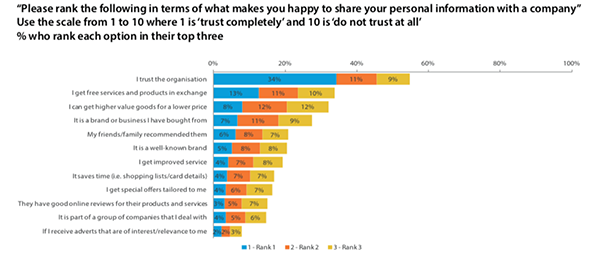If you have a wallet, everyone wants a piece of you. That’s the world that consumers live in today, and it’s the world you have navigate as you help your clients build their databases to improve their targeted marketing.
Your clients aren’t the only ones wanting their customers and prospects to open up about their personal data. Every other company wanting to improve their targeted marketing is trying to get the same information. So when on a data-gathering mission, it’s important to understand the thoughts and concerns of the people you are asking to give it.
In this industry, we are used to thinking about focusing on the benefits. This might include exchanging personal data for discounts or better, more relevant product suggestions. However, a recent study from Acxiom and DMA found that, overwhelmingly, the number one factor in consumers’ decisions whether to share data is not discounts or personalized recommendations. It’s trust.
When asked, “Rank the following in terms of what makes you happy to share your personal information,” 34% of respondents ranked trust as number one—three times the percentage who ranked “I get free services and products in exchange” (13%) and more than four times those who ranked “I can get higher value goods for a lower price” (8%) as number one.

Trust is fragile. It’s not easily won, and it’s easily lost. But the good news is, consumers feel more comfortable exchanging some of their personal data with companies than they did in the past. More than one-third (35%) of respondents agree with the statement “I feel more comfortable exchanging some personal data with companies than I did previously” compared to 9% who disagreed. This was slightly higher for men than women (36% vs. 34%), but not significantly. The highest percentage saying they are “more comfortable” comes from consumers aged 35-44. In this group, 43% agreed with this statement, higher than any other age demographic.
What makes people more likely to share personal information?
- Transparency about how their data is collected and used (56%)
- Terms and conditions that are easy to read and understand (53%)
- Privacy policy that allows them to control the types and amount of data they share (49%)
- Benefits for sharing data made explicit at the start (48%)
- Link between the data they share and the benefits are made clear (46%).
None of this is really news. We’ve seen similar data before. The point is that the data is still being gathered, and the results are consistent. As you work with your clients to build their databases, focus on trust, transparency, and benefits to the consumer. When it comes to data, it’s not exclusively about the benefits.










Discussion
Join the discussion Sign In or Become a Member, doing so is simple and free